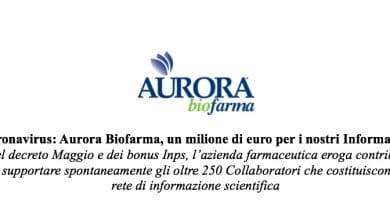
In 2009 Pfizer absorbed its rival Wyeth and, with it, also the Catania laboratory. On September 16, 2011, Pfizer sold the center to Myrmex, a company managed by Gian Luca Calvi, for one euro.
TO Once again a “no” from Myrmex. To the official request of CGIL, UIL and CISAL to withdraw the mobility procedures for workers. The company replied, as already stated in recent days to the Ministry of Productive Activities, that "there are no conditions for the revocation of the procedure".
Once again a “no” from Myrmex. To the official request of CGIL, UIL and CISAL to withdraw the mobility procedures for workers. The company replied, as already stated in recent days to the Ministry of Productive Activities, that "there are no conditions for the revocation of the procedure".
The discussion between the trade union representatives (for Filctem Cgil and CGIL, Margherita Patti, Peppe D'Aquila and Giovanni Romeo, for Uilctem Uil, Alfio Avellino, for the RSU Sebastiano Canarelli and Giovanni Cantone) and the representatives of Myrmex (present delegate Salvatore Celeste), was held this morning, 4 December, and for the occasion the unions once again expressed "their opposition to any dismissal, requesting the withdrawal of the mobility procedure as already expressed in the ministerial seat - reads the minutes of the meeting - and as invited to the company by the Ministry of Productive Activities, also by virtue of what was declared by the MIUR on the lack of continuity of research relating to the PON projects and in particular the five-year constraint of maintaining the permanent headquarters and organization ".
Furthermore, during the meeting at the Ministry, the regional councilor for Productive Activities Mariella Lo Bello proposed a public-private solution with the University of Catania and the company, which could keep the laboratory, the activity of research and existing jobs. On the subject of the constraint, Myrmex has ensured the stability of the site; an element which, however, will not have a positive influence on the fate of the workers. In practice, the company does not change its mind even in the face of the glimmer opened by the Region. “The company's attitude remains rigid despite all our attempts at confrontation. This closure for us is not synonymous with firmness but results in a lack of vision. A laboratory of excellence will close, the workers will lose their jobs and the territory will suffer another setback”, comment the unions.
04 December 2015 – Rassegna.it
Who is Myrmex
cwithin toxicology: in 2009 Pfizer absorbed its rival Wyeth and, with it, also the Catania laboratory. Following the acquisition, Pfizer Italia began a reorganization process, which involved the center and, at the beginning of 2011, however, the news arrived of its future disposal and mobility for its employees.
On September 16, 2011, Pfizer sold the center to Myrmex, a company managed by Gian Luca Calvi, a leading player in the healthcare sector but in a very different market, that of orthopedic prostheses. Calvi takes over a laboratory with international efficiency standards, an area of 10 thousand square meters and - above all - receives an exceptional gift: research programs, in collaboration with the Cnr and the Higher Institute of Healthfunded by the Ministry ofInstruction, of theUniversity and Research (Miur).
 bald, for this operation he spends one euro. And this the price it pays to Pfizer. It may seem absurd but in reality, given the market, this is not a real anomaly. Simplifying: the laboratory has no customers, since it works exclusively for Pfizer, so a start-up period is needed - about two years - to look for new orders. The start-up period, in the negotiation with Pfizer, is quantified with a liability: 15.8 million euros. In jargon it is called bad will – negative goodwill – and it is for this reason that, unbeknownst to the unions, Myrmex buys for just one euro. In reality, for the price of one euro, he still buys a building worth 10 million, machinery worth 12.6 million And laboratory equipment for another 12.5. The entire laboratory, in the notarial deed, is valued at a good 37.7 million euros.
bald, for this operation he spends one euro. And this the price it pays to Pfizer. It may seem absurd but in reality, given the market, this is not a real anomaly. Simplifying: the laboratory has no customers, since it works exclusively for Pfizer, so a start-up period is needed - about two years - to look for new orders. The start-up period, in the negotiation with Pfizer, is quantified with a liability: 15.8 million euros. In jargon it is called bad will – negative goodwill – and it is for this reason that, unbeknownst to the unions, Myrmex buys for just one euro. In reality, for the price of one euro, he still buys a building worth 10 million, machinery worth 12.6 million And laboratory equipment for another 12.5. The entire laboratory, in the notarial deed, is valued at a good 37.7 million euros.
Calvi undertakes with Pfizer to maintain the contracts stipulated with the researchers for two years: the two years expired on 16 September 2013 and the workers are increasingly worried.
Since September 2011, the industrial plan presented by the lawyer Gian Luca Calvi has not been implemented, except for the part of the transfer of research studies transferred from Pfizer. On August 7, 2013, the MIUR disbursed 3 million euros for these studies. Studies that employees are never carried out.
Taken from Miur, three million to the ghost research laboratory: "We never work"
 NB.: From the MYRMEX website: Myrmex is a Greek word meaning "ant", but also the protective nymph of the Myrmidons, an ancient people living in Thessaly, hard-working and industrious men and women but capable, if necessary, of transforming themselves into fearsome warriors.
NB.: From the MYRMEX website: Myrmex is a Greek word meaning "ant", but also the protective nymph of the Myrmidons, an ancient people living in Thessaly, hard-working and industrious men and women but capable, if necessary, of transforming themselves into fearsome warriors.
Ants know how to build amazing organized systems by making the most of the material at their disposal. They work with dedication, each following their own specific competence.
They know how to fight and suffer but, above all, they never give in: there is no crumb to carry that, however enormous, is capable of discouraging them.
Luciano Gallino. There have been reports of the closure or downsizing of companies or factories controlled by foreign multinationals, with immediate or foreseeable loss of thousands of jobs. These are signs of a completely anomalous situation that characterizes our industry. Italy is in fact the only EU country in which almost half of the chemical, pharmaceutical, food, high-end electrotechnical, household appliances, mobile telephony industries, etc. is controlled by foreign companies. Even the steel industry has taken this path, with the sale of the Lucchini steelworks to the Russians of Severstal, after the sale some time ago of Acciai Speciali Terni to ThyssenKrupp.
Evidence suggests that Italy receives little investment from abroad, and makes even less in other countries. In 2003 it received just $16.4 billion in foreign direct investment (FDI), and made a measly $9.1 billion. France has received almost three times as many, 46.9 billion dollars, and has made four times as many, i.e. 57.2 billion. Furthermore, as has been the case for some time, the investments received by Italy have in almost no case been of the green field type, ie consisting in the opening of new production units from scratch, with the relative creation of additional jobs. They have simply consisted in the purchase of companies already in operation, with minimal, and sometimes negative, effects on employment.
It would therefore seem that having passed almost half of our main industrial sectors into the hands of foreign companies has brought home the worst of globalization, that is, dependence on distant and irresponsible economic subjects; a start, in other words, to the state of a country that risks being both colonized and poor at the same time.
Related news: Crac of Marvecspharma Service Srl, the Public Prosecutors ask for the trial for the Pfizer manager
Pharmaceuticals: Gup, 19 in trial for Marvecspharma crash, 4 plea bargains
The scam of employees of pharmaceutical companies bought and sold





